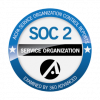As technology has improved during the past few decades, financial fraud has become more common as well. Even though technology has made a lot of our lives easier and more efficient, it also makes us more vulnerable to attack. This includes money laundering. Because money laundering is becoming so common, it is important for organizations to Institute strong anti-money-laundering programs.
Financial infrastructure does not remain immune to these attacks from cybercriminals. With numerous online transactions increasing in frequency, there are a lot of opportunities for cybercriminals who are looking for ways to engage in money laundering. As a result, it is incumbent on all organizations, including financial institutions, to Institute anti-money-laundering programs.
Why Is Money Laundering Becoming Such a Significant Threat?
From the dawn of time, money laundering has been a financial crime. In the past, most transactions were handled with paper. Therefore, they were much easier to track. Now, a lot of financial transactions are taking place online. As a result, they are becoming significantly harder to track. Some of the most important reasons why anti-money-laundering programs have become so necessary include:
- Evolution: With the evolution of technology, cybercriminals have become more sophisticated. Financial fraud is becoming more difficult to solve. Some individuals engage in money-laundering on their own. Other individuals engage in money laundering as members of the crew. With eCommerce becoming significant, it is easier for criminals to pose as online merchants, hiding their money laundering activities.
- Rising Expenses: It is also important for organizations to engage in anti-money-laundering activities because of the extreme risk this poses. If organizations do not institute AML programs now, they are only going to become more expensive in the future.
- Brand Risk: If organizations do not take steps to protect themselves and others against anti-money-laundering activities, this poses a significant risk to their reputation. Market volumes are enormous and brand values are incredibly high. Therefore, they have a lot to lose if they are associated with a large money laundering transaction.
- Client Risk: AML programs are also necessary because of the risk they pose to the client. The compliance process is a process that may slow down the transaction of clients. Organizations that think about this ahead of time will be able to expedite this process for their clients, keeping them happy without sacrificing AML quality.
- Regulatory Risk: Finally, organizations that do not have robust anti-money-laundering programs in place leave themselves open to significant regulatory risks. This could come in the form of fines and sanctions.
These are just a few of the biggest reasons why all organizations need to prioritize the implementation of strong AML programs. Financial crime is not going to stop anytime soon. It is incumbent on all organizations to do their part to institute a strong AML program.
Where Does Money Laundering Take Place?
Ultimately, money laundering is a program that hits just about every industry. Of course, it is more common in some industries than in others. In general, money laundering takes place when an individual or group seeks to take illegal funds, mix them with legal funds, and withdraw their funds on the other side, making it impossible for someone to tell the difference between the two. Some of the industries that are regularly targeted by money launderers include:
- The banking industry
- The real estate industry
- Currency exchange investors, also known as Forex
- Investment and brokerage firms
- Casinos and gaming companies
- The insurance sector
Companies in these industries need to keep up with the latest regulations both in their country and in their industries in order to make sure they remain in compliance with all AML rules.
Institute a Strong AML Program
It is important for all organizations to make sure they institute a strong AML program to protect not only themselves but also their clients. AML programs need to comply with all regulations while also taking protective measures on behalf of the company against financial crimes. Compliance has to be monitored and internal controls have to be put in place.


